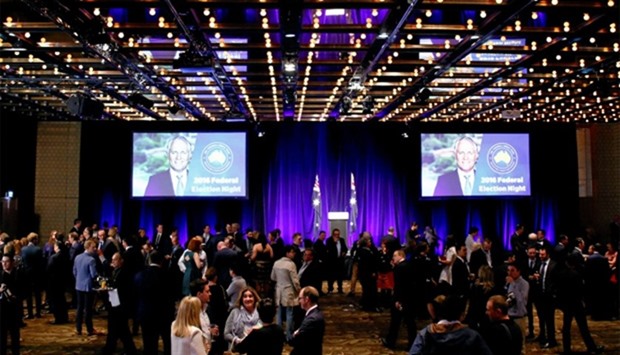* Independents and labour encroach on coalition seats
* Winner unlikely to be called Saturday evening:ABC
* PM Turnbull had urged a vote for stability after Brexit
Australia appeared to be heading for a ok, hung parliament or a minority government with half the votes counted in a national poll on Saturday, potentially blocking Prime Minister Malcolm Turnbull's ability to enact major economic reforms.
Official electoral data halfway through the count for the House of Representatives showed a 3 percent swing away from the Liberal-led coalition government.
On the current count, the coalition was projected to hold 69 seats, against the opposition labour Party's 70 seats and five to independents and the Greens Party.
The coalition is expected to win several of the remaining 16 seats to be determined, but it is unclear if it will be enough to form a government without an alliance with small parties and independents to get a majority.
The result was so close, Attorney-General George Brandis said it would not be called on Saturday evening with just a couple of hours before counting officials clock-off. There is no counting scheduled for Sunday, with counting for the Senate to resume on Monday and the House of Representatives on Tuesday.
Former prime minister Tony Abbott, who retained his Sydney seat, told Liberal Party followers in his electorate it was a ‘difficult night’.
At the coalition headquarters in central Sydney, the mood was nervous and quiet as the crowd thinned. A Reuters reporter was prevented from taking a photo of a champagne-filled fridge.
‘It's a nightmare, it's a disaster,’ Rene Licarta, a Liberal Party member, told Reuters. ‘It looks like it might be a hung parliament, with the Greens and the independents running the show. It's scary.’
Such a result would mean that Turnbull's gamble of dissolving both houses of parliament in May to trigger the election has backfired, given that was a bid to oust intransigent independents in the upper house Senate who had blocked his agenda.
Turnbull had called for Australians to vote for the coalition and political stability, invoking the global economic and political fallout from Britain's vote to leave the European Union.
Minor parties, possibly in a coalition with centre-left labour, he argued, could not be trusted to manage an economy hampered by the first mining downturn in a century and balance public finances after years of deficits.
With half the vote counted, labour was benefiting from a 3.3 percent swing in its favour on a two-party basis, short of the 4 percent it needs to win government but potentially enough to leave the coalition with a minority government.
At the labour Party's federal election headquarters at the Moonee Valley Racecourse in Melbourne, the mood was initially subdued but cheers began to ring out as labour pulled ahead in key seats.
The votes tallied on Saturday evening only gave limited results for the 76 seats of the upper house Senate, where independents including the centrist Nick Xenophon Team are expected to win several seats.
Pauline Hanson's One Nation party was polling strongly in Queensland according to an early Senate vote count, raising the prospect that the far right politician, who campaigned on anti-immigration, anti-Muslim agendas, will be back in the federal parliament after an almost 20 year absence.
Xenophon has vowed to block the Coalition's cornerstone A$50 billion ($37 billion) corporate tax cuts if his party holds the balance of power in the senate.
Xenophon's party had an early win stealing a House of Representatives seat for the electorate of Mayo from the coalition for the first time in its 115-year history and giving the party its first ever lower house position.

